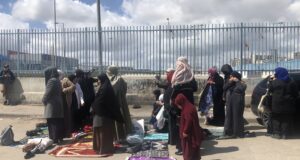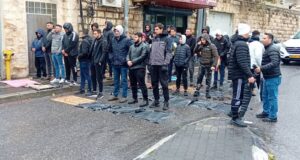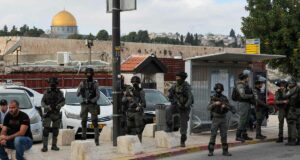By Jonathan Cook, Foreign Correspondent
To view original article, published by The National, click here
JERUSALEM: It must be the smallest Israeli settlement in the occupied Palestinian territories: just half a house. But Palestinian officials and Israeli human rights groups are concerned that it represents the first stage of a plan to eradicate the historical neighbourhood of Sheikh Jarrah in East Jerusalem, cutting off one of the main routes by which Palestinians reach the Old City and its holy sites.
The home of Mohammed and Fawziya Khurd has been split in two since 1999 when the Israeli courts evicted their grown-up son Raed from a wing of the property. The elderly couple have been trying to regain possession, but were stymied last week when an Israeli high court backed the petition of a group of settlers and ordered the immediate eviction of the Khurds. The decision paves the way for the takeover of 26 multi-storey houses in the neighbourhood, threatening to make 500 Palestinians homeless.
The verdict has been denounced by Mahmoud Abbas, the Palestinian president, and in the past few days the Khurds have been visited by foreign diplomats, including from the United States. In a letter to consulates in Jerusalem, including those of the United States, Britain, France and Germany, Rafiq Husseini, Mr Abbas’s aide, warned that the takeover of the Khurds’ home was part of a wider drive to change the geography of Jerusalem by forcing out Palestinians and replacing them with Israeli settlers. Such a development would deal a death blow to already-strained peace negotiations, he wrote.
Today there are 250,000 Israeli Jews living illegally in East Jerusalem, and the Israeli government has announced that thousands more apartments are to be built – despite promises to the US government to freeze settlement growth.
Israeli human rights groups and Palestinian solidarity activists, meanwhile, have been staging a 24-hour vigil at the Khurds’ home in the hope of preventing the order’s enforcement.
According to Meir Margalit, an analyst on Israeli policies in Jerusalem, the Sheikh Jarrah evictions are part of a much bigger goal being pursued by shadowy settler groups, backed by the Israeli government, to establish wedges of Jewish settlement around the Old City and secure it for any future peace agreement.
“The settlers have submitted a plan to the Jerusalem municipality seeking the demolition of Sheikh Jarrah’s Palestinian homes to make way for the building of 200 apartments for settlers,” he said. “They have chosen one of the most sensitive sites in East Jerusalem: it’s full of Palestinian political and cultural institutions. Its takeover would contribute significantly to the encirclement of the Old City.”
The Khurds and other Palestinian families have been living in Sheikh Jarrah since the mid-1950s, when the Jordanian government and the United Nations allocated them land as refugees. All had been forced out of areas that became Israel in 1948.
After Israel’s occupation of East Jerusalem in 1967, however, the settler organisations began pressing their claims to former Jewish homes. A religious organisation, the Sephardi Jewry Association says it purchased Sheikh Jarrah’s lands in the 19th century. The families’ lawyers, on the other hand, say the land belongs to the Darwish family. The courts have been unable to authenticate the documents, which date to a murky period of land dealings.
Until last week’s decision, the courts had decided that the Palestinian residents should be allowed to stay in their homes as “protected tenants” until ownership could be determined.
However, the courts insisted that the families pay rent to a trust set up in case they found in favour of the Sephardi Association at a later date.
The families argue that, under the terms of the deal with the Jordanian government and United Nations, they were entitled to ownership of the properties after 30 years. The eviction order against the Khurds is believed to have been issued after Mohammed Khurd, 55 and bedridden, was unable to keep up his payments.
The Khurds say they have faced constant pressure since settlers moved in next door. “At first we were offered a lot of money to leave,” said Mrs Khurd, 62. “When we refused, the settlers started making our lives a hell. The family next door changes every few months to make it difficult for us to start legal proceedings.
“Armed Israeli guards have been posted on the path to our house and there are a network of surveillance cameras to watch our every move. Armed settlers have broken into the house, pointing their guns at us.
 International Solidarity Movement Nonviolence. Justice. Freedom.
International Solidarity Movement Nonviolence. Justice. Freedom.


